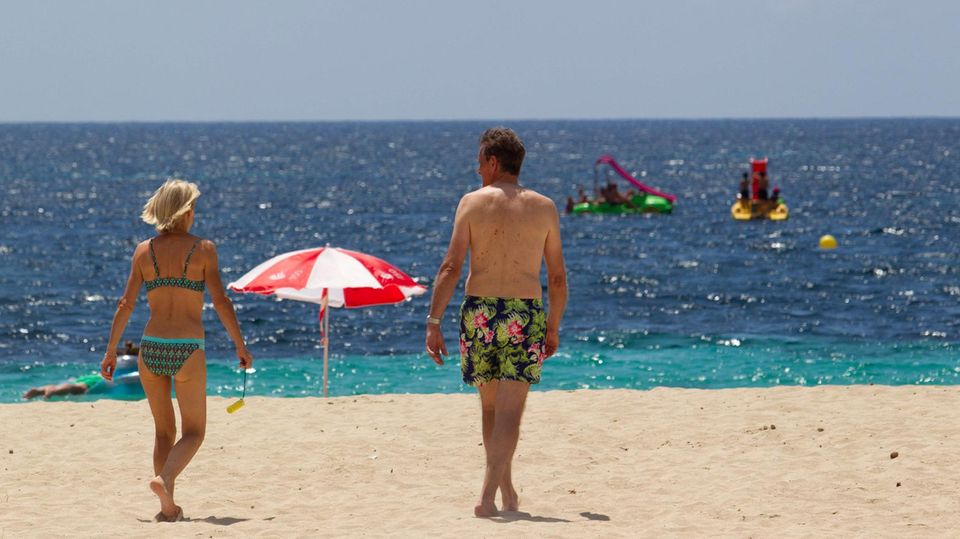Spain, the Netherlands – Great Britain-the number of infections is rising again. Especially younger people get sick with Covid-19.Many are unvaccinated, but can not take the celebration. A number of countries are now fighting the parties and taking back easing measures.
Summer, low incidences, open bars. It could all be as beautiful as it once was in 2019. Back then, before Corona, when you could still dance carefree through the night. But the virus is still dancing along. At Topsy Turvey, a Karlsruhe club, for example, where 34 people tested positive for Corona after a night of partying. Or at the Verknipt festival in Utrecht, where almost 1000 visitors are said to have become infected on the first weekend of July. No isolated cases. In several European countries, the number of infections recently rose again – especially among the younger ones. Did it dance again soon?
In Spain, the virus has long since picked up speed again. The seven-day incidence is currently at a whopping 258 cases per 100,000 inhabitants, in Catalonia even at 579-despite good vaccination rates. Almost 60 percent are already fully vaccinated. Of the over-40s, 89.2 percent have already received at least one vaccine dose, 70.6 percent are fully vaccinated. But the virus finds its way. Affected by this new corona wave are especially the younger ones, those who have not yet been vaccinated.
Among the under-30s, the incidence is over 1000, as the” Süddeutsche Zeitung ” wants to know from the Spanish health authorities. Even more serious is the situation in the hotspot Catalonia with an incidence of 2400 among young people up to 19 years, and with about 3000 among 20 – to 29-year-olds. In addition to the end of the mask requirement, one reason for the rapid spread of the delta variant is cited above all: parties.
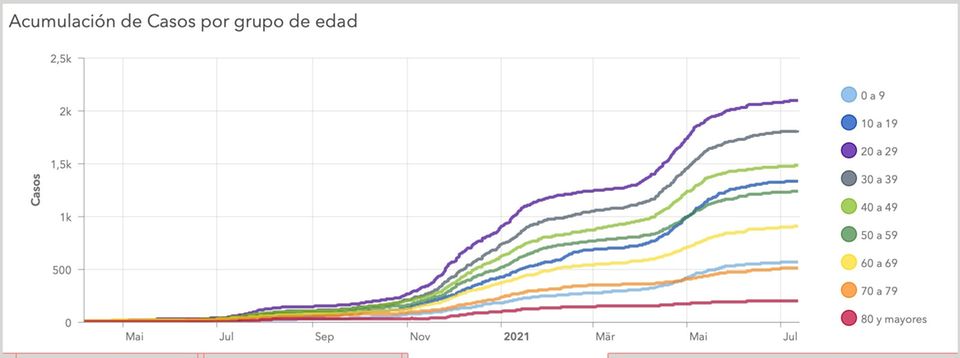
The upper curve (purple) shows the increase in corona cases in the age group 20 to 29 years.
© experience.arcgis.com
Celebrations prohibited
One way to reduce the risk of infection, the competent therefore see in the fun of celebrating to decay. On Barcelona’s beach, exuberant, alcohol-heavy beach parties were recently celebrated. The city administration now announced that it would spray the beaches with water. The wet sand is supposed to thwart people from settling there. In restaurants, bars, sports and cultural venues is for the time being again at 23.30 clock Zapfenstreich. And adjustments are also being made in other Spanish regions. Valencia has already introduced a night curfew, which takes effect in places that are particularly badly affected. In the Canary Islands, too, they want to examine such an application.
A similar picture emerges in the Netherlands. Also there are since Friday in discos and clubs the lights off again, festivals prohibited. According to RIVM, the responsible Office for Health and the Environment, the most contagions have taken place where celebrations were held. The government had eased corona measures early on, now has to row back – somewhat contrite, Prime Minister Mark Rutte apologized. Because the numbers are increasing explosively. The R value in the country has climbed to 2.17. That is the highest figure since the pandemic began last March, the RIVM told parliament in The Hague on Tuesday.
The seven-day incidence was estimated at around 270. As in Spain, the virus is rampant primarily among 20-29 year olds. The curve representing the infection rate of this group recently rose almost vertically. Last Saturday, it reached a peak with a value of 156,2 new infections among 100.000 inhabitants, followed by the 10 – to 19-year-olds with 81,1 new infections. Thus, these two groups are by far the leaders.
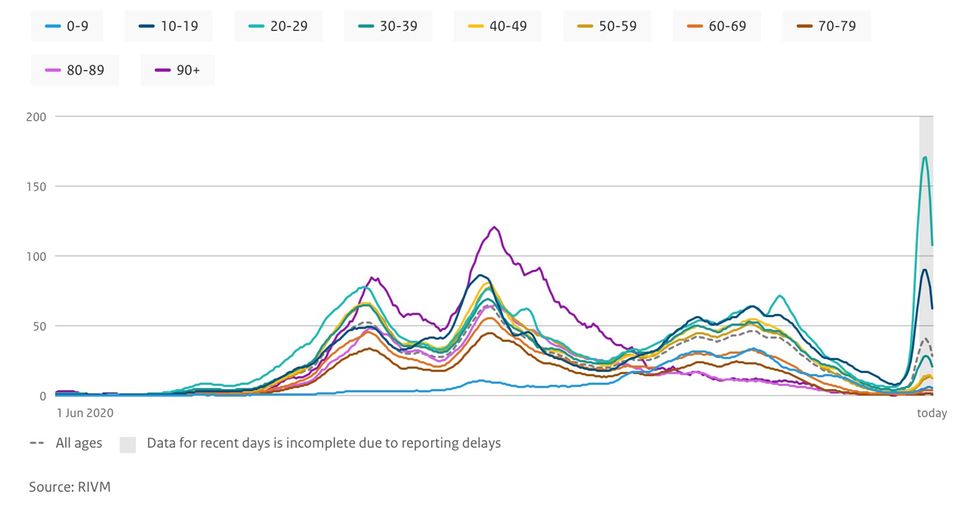
The light green curve shows the increase in infections in the age group 20-29 years.
Infection rates increase? Never mind!
And then there’s England. On the island, the delta variant has been driving the infection numbers up again for some time. About two-thirds of the adult population is now fully vaccinated. And the incidence? Over 320. Nevertheless, you do not want to hear about restrictions there. On 19 July, all mandatory corona measures are to be repealed. Then not only the mask requirement falls, but also distance rules and registrations in the restaurants. The clubs open again. From then on, there will be no visitor limit. Experts had still tried to push through a postponement of the easing with a letter published in the “Lancet”. They called this a ” dangerous and unethical experiment.” They warned of the danger to younger, unvaccinated or semi – vaccinated people. A look at the new infections also shows that most of the infections take place in the group of younger people between the ages of 12 and 24.
The figures in the UK, Netherlands and Spain are no surprise. Experts have been warning for some time that if the number of cases rises again, the unvaccinated population groups will be particularly affected. “It is a fallacy to think that we can afford a higher incidence if the vaccination rate continues to rise. For the unvaccinated, the risk remains very high, “said health expert Karl Lauterbach in June, the “Rheinische Post”. And also world doctors head Frank Ulrich Montgomery told the “Redaktionsnetzwerk Deutschland” with regard to the much more contagious delta variant: “Those who do not get vaccinated will sooner or later become infected with the coronavirus.”
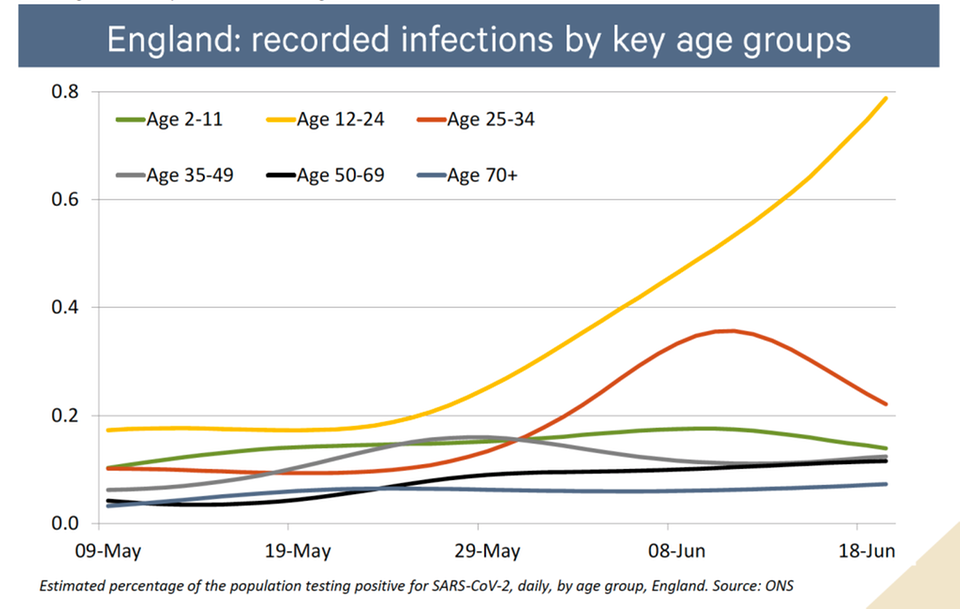
The yellow line shows the corona infections in the age group 12 to 24, the red line shows those in the age group 25 to 34.
Also in Germany more younger infected
A first trend can already be seen in Germany. Compared to other European countries, the Federal Republic of Germany is currently doing well with a seven-day incidence of 7.1, but the figure has also been rising slightly in this country for a week-although the infection numbers are declining in almost all age groups. But not in all of them. Germany is no exception: the number of infections among young adults between the ages of 20 and 29 is increasing, especially in the age group between 20 and 24 years. According to the Robert Koch Institute (RKI), the seven-day incidence increased from 10 to 19. For comparison: in the 75-to 84-year-olds, the value dumps at 1.
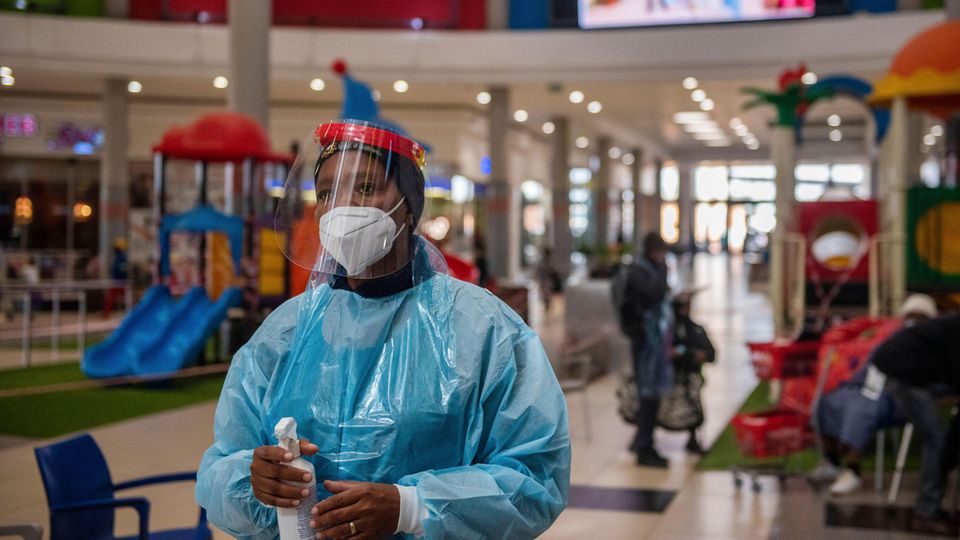
“There is no reason to believe that the situation in Germany should develop substantially differently than in countries that are a few weeks ahead of us in terms of infection dynamics and have similar framework conditions in terms of vaccination rates, infection control measures and climate,” epidemiologist André Karch said in an interview with Der Spiegel. Probably, there will also be an increased spread of infection in those parts of the population where the vaccination rate is still relatively low and where at the same time contact behavior is currently intensifying most strongly, for example in the context of celebrations and other events with many people.
“If we want to counteract this without changing the framework conditions, it would be central to increase the vaccination rate among young people, who are particularly affected here,” says Karch. According to the RKI, the vaccination rate for 18 to 59 – year-olds currently stands at 41.8. For under-18-year-olds at a meager 1.6. For children aged 12 and over, the Permanent Vaccination Commission has still not issued a general vaccination recommendation. Vaccination is recommended only for children and adolescents from 12 years of age with previous diseases. Overall, 43.7 percent are currently fully vaccinated in Germany.



